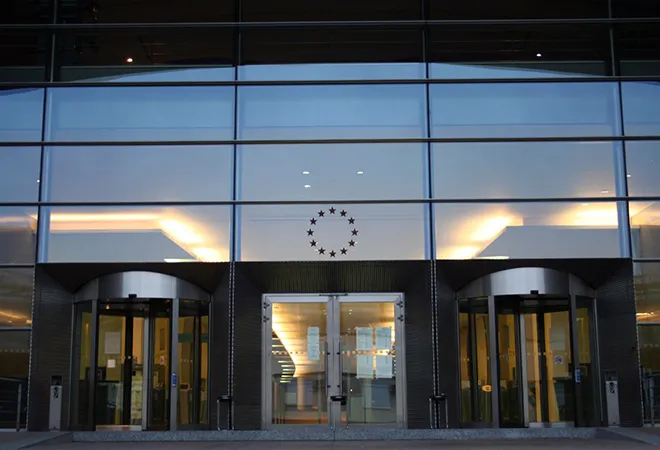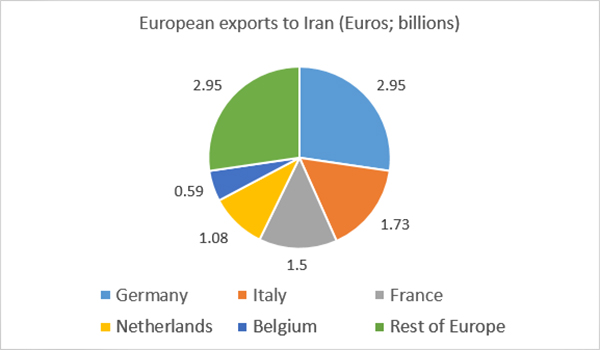-
CENTRES
Progammes & Centres
Location
The volatile security situation in the region, a nuclear arms race and a possible war against Iran would directly affect Europe, if only by causing a new wave of refugees to the EU that has already been grappling with the influx of migrants for the last few years.

Image Source: Russell Trow — Flickr/CC BY 2.0
When US President Donald Trump announced in May 2018 his exit from the Joint Comprehensive Plan of Action (JCPOA), better known as the Iran nuclear deal, European leaders were — for once — united in outrage. The President of the European Council, Donald Tusk summed up the European mood in one sentence: “With friends like that, who needs enemies?”
Trump’s move has been the latest irritant in a number of escalating unilateral US policy decisions that puts the transatlantic partnership to a vital test. It blatantly ignores security concerns of Europe, for which West Asia is the immediate neighbourhood. The volatile security situation in the region, a nuclear arms race and a possible war against Iran would directly affect Europe, if only by causing a new wave of refugees to the EU that has already been grappling with the influx of migrants for the last few years.
It is also an assault on the way the European Union sees its role on the world stage. For those who were involved in the long negotiations with Iran, the deal was a masterpiece in diplomacy and proof of the European philosophy that there is virtue in talking. The High Representative of the EU for Foreign Affairs, Federica Mogherini called it the “culmination of 12 years of diplomacy.”
Last but not least, the economic interests of European companies stand to be affected. This will most probably lead to a collapse of the deal, but the damage goes well beyond financial losses. Iran has threatened to start enriching uranium again if it can no longer see any economic benefit from the deal that lifted earlier sanctions on the Islamic Republic.
The economic interests of European companies stand to be affected. This will most probably lead to a collapse of the deal, but the damage goes well beyond financial losses.
The value of trade between Iran and the European Union went up from 7.94 billion euros in 2015 to 21.6 billion euros in 2017, but investments never really soared. A large number of companies from Iran’s main European trading partners — Germany, Italy, France, the Netherlands and Belgium — visited Iran during that year, but the time between inking the deal and its cancellation was rather short. Figure 1 gives a country-wise composition of European exports to Iran.
 Source: Austrian Economic Chamber (WKÖ)
Source: Austrian Economic Chamber (WKÖ)
According to a survey by the International Crisis Group (ICG)<1> based on interviews with 60 senior managers of relevant international companies, 79 percent said they had delayed their plans to enter the Iranian market even before Trump finally pulled out; 57 percent cited as reasons, fear of existing US sanctions or a snapback of the nuclear ones.
Trump’s refusal to recertify the deal in October 2017 already led to a massive capital flight from Iran. The ICG report published in January 2018 quotes a European banker to have said: For “most of the international banks, the JCPOA is already dead.” The financial sector had been strongly affected by earlier US sanctions against Iran when banks had to pay fines of millions of Euros for transgressions.
“Many projects have failed because of difficulties in financing”, said Amir Alizadeh, Deputy Head of the German-Iranian Chamber of Trade (AHK) in Tehran. Germany is Iran’s largest European trading partner with an export volume of 2.95 billion Euros in 2017, which is a mere 0.2 percent of Germany’s exports. There are around 100 German companies in Iran but most of them are rather small. One of the biggest ones, the chemical company BASF, has only 78 employees in Iran. <2>
The main problem for European companies is fear of “secondary sanctions” that include a cut-off from the US financial system for companies who continue to work in Iran. The French energy giant, Total, recently signaled that it would quit a multi-billion-dollar gas project in Iran if it fails to secure a waiver from US sanctions. Earlier, German insurance giant Allianz and the Danish shipping operator Maersk Tankers had announced that they are preparing to wind down their Iran-related businesses.
The EU might come up with some protection for small and medium size companies that have invested in Iran, as German Chancellor Angela Merkel said. It might also reactivate the “blocking statute” from 1996 that prohibits European companies from complying with US sanctions, as the President of the European Commission, Jean-Claude Juncker announced and allow the European Investment Bank (EIB) to facilitate investments in Iran.
The “blocking statute” was developed to get around the US trade embargo on Cuba, but was never enacted. It would require a lengthy process and the consent of the 28 EU member states. In the end, Angela Merkel will probably remain right when she said that Europe cannot protect its “whole economy” from US sanctions. What seems worse, though, is that nor can Europe protect its security interests, let alone its self-respect.
This essay originally appeared in ORF Special Report Beyond JCPOA: Examining the consequences of US withdrawal.
<1> “The Iran Nuclear Deal at Two: A Status Report”, International Crisis Group, 16 January 2018.
<2> “Deutsche Firmen in Iran. Boom, wo bist du?”, Der Spiegel, 5 January 2018,
The views expressed above belong to the author(s). ORF research and analyses now available on Telegram! Click here to access our curated content — blogs, longforms and interviews.

Britta Petersen is a German journalist and political scientist. She is currently a Senior Fellow at the Observer Research Foundation and works on India-EU relations. ...
Read More +